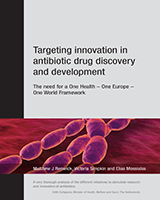NCBI Bookshelf. A service of the National Library of Medicine, National Institutes of Health.
Renwick MJ, Simpkin V, Mossialos E. Targeting innovation in antibiotic drug discovery and development: The need for a One Health – One Europe – One World Framework [Internet]. Copenhagen (Denmark): European Observatory on Health Systems and Policies; 2016. (Health Policy Series, No. 45.)

Targeting innovation in antibiotic drug discovery and development: The need for a One Health – One Europe – One World Framework [Internet].
Show detailsThe 2016 Dutch Presidency of the European Union (EU) has named antimicrobial resistance (AMR) a top priority in their upcoming policy agenda and held a Ministerial Conference on this issue in February 2016. In preparation for this conference, the Dutch Ministry of Health, Welfare and Sport commissioned the London School of Economics’ health research centre, LSE Health, to submit a report that would provide a platform for discussion among the attending European Ministers of Health and Ministers of Agriculture. More specifically, this report would review current policy instruments aimed at incentivizing the innovation of novel antibiotics, alternative therapies and diagnostic devices that support the rapid assessment of bacterial infections. This report would build on LSE Health’s previous research commissioned by the Swedish government.1 One follow-up implication of this previous report was the establishment of the Transatlantic Taskforce on Antimicrobial Resistance.
Antimicrobial resistance is a complex, multi-factorial problem requiring a global solution that tackles the issue from multiple different angles. One key aspect of a global solution is the development of novel antibiotic drugs to support or replace the increasingly ineffective set of antibiotics currently available. However, the pipeline for antibiotics is limited because there are numerous scientific, regulatory and economic barriers that prevent adequate investment in antibiotic research and development (R&D). In response to this growing crisis, multiple R&D initiatives have been implemented at international, EU and national levels to reinvigorate the antibiotic development pipeline. These are an excellent first step, however, it appears that the current programmes are not sufficient to repair the pipeline; additional intervention is necessary.
The primary objective of this report is to identify gaps in the European R&D agenda for antibiotics, as well as to recommend solutions to identified policy gaps. Through an extensive review of literature and input from experts in the field, we first seek to identify the existing set of initiatives that incentivize R&D of antibiotics and related medical products. We review international and EU R&D initiatives and additionally national programmes in the US, Canada, UK, France, Germany, Sweden and the Netherlands. Following this mapping exercise, we will discuss the most important initiatives and apply an analytical framework to assess these programmes. Finally, based on our research we will identify key policy questions that deserve further discussion. This discussion will ultimately inform our set of policy recommendations on how to improve the European R&D agenda for antibiotics.
- Objectives - Targeting innovation in antibiotic drug discovery and developmentObjectives - Targeting innovation in antibiotic drug discovery and development
Your browsing activity is empty.
Activity recording is turned off.
See more...